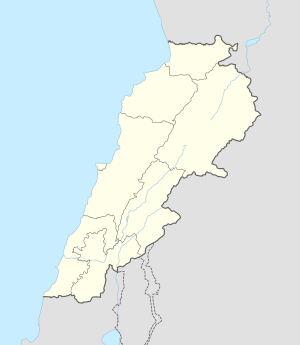Zawarib
Al-Zawarib
زواريب | |
|---|---|
| Coordinates: 34°31′57″N 36°03′34″E / 34.53250°N 36.05944°E | |
| Country | |
| Governorate | Akkar |
| District | Akkar |
| Government | |
| • Mayor | Nametallah Wehbe (Elected May 2016) |
| Elevation | 200 m (700 ft) |
| Time zone | +2 |
| • Summer (DST) | +3 |
Zawarib, Al-Zawarib, Zouarib (Arabic: الزواريب) is a village in Akkar Governorate, Lebanon, situated on a hill above the Akkar valley and overlooking the Mediterranean Sea. Zawarib is surrounded by the village of Miniara from the South and Sheik Taba from the North.
Social life
The village population is around 1000 many of them live outside Lebanon. 283 persons voted in the 2009 municipal elections to elect 9 village council members. All the village residents are Christians with a majority of Greek-Orthodox.[1]
Families
The major families in Zawarib are: Naddour, Matar, Nader, Farah, Farfour, Saoud, Chahoud, Wehbe, Fakhoury, Habib, Daas, Greige, Nabout and Tohme.[citation needed]
Education and Employment
There is a relatively high literacy in the village. A few prominent Ph.D. holders, and much more Master’s degrees holders especially among the young generation. The most prominent intellectual personality from Zawarib is Dr. Suheil Farah, a professor in history who was the first foreigner to be granted the highest award of the Russian Academy and a nominee for Nobel Peace Prize in 2018. Other occupations include: Doctors, lawyers, teachers, engineers, and employees in the public sector. Many of the poorly educated youth are enrolled in the Lebanese Army and Internal Security Forces with many highly ranked officers among them.[citation needed]
References
- ^ "Municipal and ikhtiyariah elections in Northern Lebanon" (PDF). The Monthly. March 2010. p. 21. Archived from the original on 3 June 2016. Retrieved 3 November 2016.
{{cite web}}: CS1 maint: bot: original URL status unknown (link)
External links
- Zouarib, Localiban


